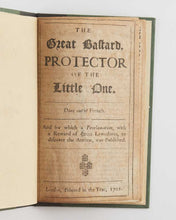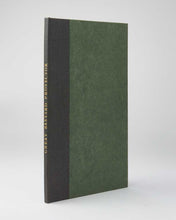[GLORIOUS REVOLUTION.] The Great Bastard, Protector of the Little One. Done out of French. And for which a Proclamation, with a Reward of 5000 Lewedores [sic], to discover the Author, was Published. London: [n.n.]. 1701.
8vo. Modern cloth-backed green boards, spine lettered in gilt; pp. 16, typographic ornaments to title; contents uniformly toned, the odd spot, trimmed close at head in places, occasionally touching page numbering; a very good copy overall.
Third edition of this scurrilous pamphlet insinuating the illegitimacy of both Louis XIV (“the great bastard”) and James, Prince of Wales (“the little one”).
Prince James of Wales, known as the “Old Pretender” and “King over the Water”, was born on 10 June 1688 at St. James’s Palace, only six months before his father, King James II, went into exile in France. Welcomed by cousin and ally Louis XIV, James and his family were granted a palace and a pension.
Although claiming to have been “done out of French”, this anonymous pamphlet is in fact an original English work. It centres on the French king, adducing evidence of Louis XIII’s impotence, or “indifference for the fair sex”, and asserting instead that Louis XIV was the son of a “Monsieur Le Grand”, in accordance with a scheme of Cardinal Richelieu – hence the king’s epithet “Le Grand” being in truth the surname of Louis. The author concludes: “Why should not Lewis raise his bastard brother? Kind nature makes one bastard love another”.
First published in 1689 at the height of the Glorious Revolution, it enjoyed considerable success, with several editions appearing in the early eighteenth century. A copy of the first edition is recorded in the library of Benjamin Franklin (see Wolf and Hayes).
ESTC T35825
#2122523




